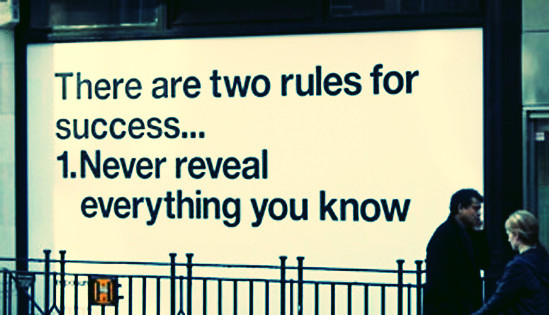
Why The So-Called "Rules of Success" Shouldn't Apply
“There are two rules for success:
1) Never reveal everything you know.”
I’m sure you’ve heard this quote by Roger H. Lincoln at some point in your life. When I first started my journey into writing while figuring out how to make a career out of what I love (which I am still in the process of) I thought this quote was everything I ever needed to know; after all, I’ve asked millions of questions to people who purposefully skated around answering them, like the insight I was inquiring about was somehow top secret information. I’d ask questions to students in college, wondering what the coursework was like and if they were enjoying it. I’d ask so-called professionals in my desired field what I should do in order to get to where they are. Simple, honest questions that I thought, at the time, were non-intrusive; questions I thought (and was taught) to ask when considering all parts of a career spectrum. All of these questions were dodged which left me thwarted and fed up - especially with that dreadful quote - but not for long.
Once I got my spark back I made my own luck, so to speak, writing for a well-known music and entertainment website that allowed me to create my own platform while making a name for myself. Those three years of learning the ropes on my own taught me about resilience and community while I was creating the kind of brand I want to be known for in the future. I am now the founding-editor-in-chief of my very own music site, The Daily Listening – all because I found the confidence to take control of what I wanted rather than wait for others to dole out advice in order to make any moves of my own.
I think Lincoln had it all wrong. Success isn’t about hiding what we know but about sharing our personal experiences. It's about having a strong sense of mutual respect for the individuals around you while paying it forward. The act of knowledge-hoarding describes everything that is wrong with our workforce, forming an undesirable sense of competition rather than partnership. The constant paranoia of ulterior motives has stigmatized our society as disgustingly self-seeking, something I can only do my part in changing over the course of my own life. After all, the word, “colleague,” is defined as a person with whom one works, especially in a profession or business – also known as a teammate, ally and collaborator. In order to keep the peace, we need to be for each other rather than against.
Now that I am managing my own site, I’m finding that others are now asking me for advice on writing and how to get where I am. It’s funny when I’m asked that because up until they asked, I always thought of myself as still climbing the ladder, which, make no mistake, I still am – but it’s nice to hear that my guidance has helped others in some way and that people respect me for an honest, no holds-barred answer. Of course, not every story starts off like ours, but it’s a nice stepping stone when you’re young, confused and terrified of making a wrong move.
The truth of the matter is, providing insight isn’t going to harm your career nor will it diminish what you’ve already accomplished. If everyone was willing to help each other out, imagine what we could achieve. If I’ve learned anything throughout that period of seeking information to better myself, it’s that the people hoarding their so-called knowledge don’t know a single thing about success, which, in turn, makes it easier for those success stories on-the-rise to sort out the bad seeds they probably should be avoiding in the long run.
This truly resonated with me. I had a very similar experience in the touring world eight years ago. You know...we're coming up together. Managers, especially, would skirt around communication and be non-responsive until I found that right people who were open and eager to share information. That's where the opportunities were. And I believe that applies to everything in life. Whatever appears to be a shut door isn't meant for you to open because there is something far better waiting for you to intersect. Once I figured out this perspective, I no longer got frustrated. I do admit I am hesitant in some communication when reaching out these days, but that's only because I want to make sure that what I'm trying to communicate is valuable for the receiver. Paying it forward, like you said, is key! And that starts with the sharing of information and ideas.